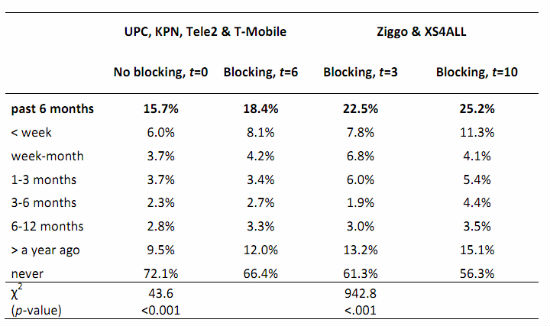Censoring The Pirate Bay Is Futile, Research Shows
jeudi 22 août 2013 à 16:22 The Pirate Bay is arguably the most censored website on the Internet. Courts all around the world have ordered Internet providers to block subscriber access to the torrent site, and more are expected to follow.
The Pirate Bay is arguably the most censored website on the Internet. Courts all around the world have ordered Internet providers to block subscriber access to the torrent site, and more are expected to follow.
The idea behind these blockades is that they will help to decrease online piracy. However, research increasingly suggests that this aim is not being fulfilled. In fact, the blocking attempts may actually be having the opposite effect.
Today, University of Amsterdam researchers, together with Tilburg University’s CentERdata, released a new report which evaluates how the Dutch Pirate Bay blockade affected local piracy habits.
Titled “Baywatch,” the paper uses survey results as well as data from BitTorrent trackers to assess the effectiveness of the blocking measures.
The report finds that of all respondents who admit that they’ve downloaded files from illegal sources over the past half-year, between 20 and 25 percent say they stopped or downloaded less after the Pirate Bay blockade came into effect.
While this could be interpreted as a clear success for the blockade, the researchers don’t see any evidence for this in the rest of the data.
“This would suggest a small negative effect of the intervention on the percentage of the population who download copyright protected content from illegal sources. However, no such effect is found.”
In fact, the percentage of UPC, KPN, Tele2 and T-Mobile subscribers who admit to downloading or streaming from illegal sources over the past six months went up from 15.7% before the blockade, to 18.4% after. For two other ISPs, Ziggo and XS4ALL, the percentage increased over time as well, settling at 25.2%.
Downloading & streaming from illegal sources per blocking situation

The researchers believe that the increased piracy rates can in part be explained by people who picked up the downloading or streaming habit after the blockades went into effect.
“[Although] a small share of downloaders report a decrease in their downloading activities after the blocking, this effect is not reflected in the overall numbers, possibly because there are other consumers who have started downloading from illegal sources,” the researchers write.
In addition, they note that affected Pirate Bay users may have simply started using other means to get unauthorized content. In any case, there appears to be no negative long-term effect of the court ordered-blockade on the overall piracy rate.
“Blocking access to TPB has had no lasting net impact on the overall number of downloaders from illegal sources, as people learn to use alternatives to TPB.”
In addition to the survey data the researchers also monitored several popular BitTorrent swarms. Here they also found no clear impact of the blockade. Initially the market share of blocked ISPs appeared to decline, but this picked up later.
The researchers believe that this can be explained by the fact that subscribers find ways to circumvent the blockades.
The above, paired with the survey responses, leads the researchers to conclude that after an initial decrease in piracy the “market” quickly returned to the old situation. In other words, censoring The Pirate Bay proves to be ineffective in the long run.
This is not the first research to come to this conclusion. Previously the ineffectiveness of the blockades was highlighted by several Dutch and UK Internet providers, who claimed that BitTorrent traffic didn’t decline after the blockades were implemented.
Whether this will stop copyright holders’ efforts to demand additional and wider blockades is doubtful though – thus far it certainly hasn’t.
Source: Censoring The Pirate Bay Is Futile, Research Shows

 However, the MPAA tried this before with SOPA and PIPA and soon discovered they were no match for the combined forces of the Internet.
However, the MPAA tried this before with SOPA and PIPA and soon discovered they were no match for the combined forces of the Internet. As the famous quote from Benjamin Franklin goes, there are only two certain things in life – death and taxes.
As the famous quote from Benjamin Franklin goes, there are only two certain things in life – death and taxes. Over the past several years we have covered many copyright disputes, but now we have become part of one ourselves.
Over the past several years we have covered many copyright disputes, but now we have become part of one ourselves.

 With a growing demand for digital books, the publishing industry is increasingly confronted with the issue of online piracy.
With a growing demand for digital books, the publishing industry is increasingly confronted with the issue of online piracy.